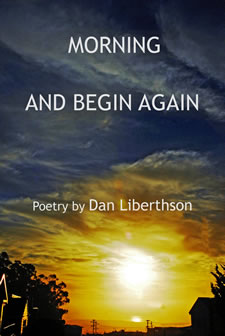Morning and Begin Again
Morning and Begin Again brings together over one hundred poems that address the profound and often tormenting ambiguities of human life. In “Lattice,” the first poem of an opening sequence about childhood, the sight of a garden lattice brings to mind an early memory of the light-and-shadow pattern cast by a trellis seen by the writer as a small boy playing under the porch of his home. He is just beginning to sense the basic contradictions of human existence: presence versus absence, life versus death, good versus bad, pleasure versus pain, love versus shame. The bright and dark pattern cast by the lattices summarizes these dichotomies, viscerally for the child and symbolically and emotionally for the reflecting adult. These themes are expanded in subsequent poems.
The section called “Love” portrays a similar ambivalence in the author’s experience of romance and marriage, his bright, warm feelings of affection contradicted by dark, cold feelings of antipathy. In the “Transience” segment, the contrast is between the potent joy of living and the equally acute awareness of dying. The poems of the “Depression” sequence portray the difficult emotions of this “dark night of the soul,” which are, however, leavened by a sometimes indiscernible ray of light, the hope of rescue and renewal, sunrise and morning. Segments about the impact of nature and art and the poet’s responses to specific locales elaborate the theme of the contradictions inherent in living, mainly the inexorable linkage of birth and creation with decay and destruction. In “Remembrances,” the concluding sequence, elegiac poems highlight the mix of celebration and loss, joy and sorrow, that accompanies memories of departed loved ones, who in death persist and nurture within, even as the finality of their loss rakes the soul.
How You Get It: Order from Amazon.com in paperback, ($7.99) or on Kindle ($2.99) via the following link: Buy Morning and Begin Again at Amazon
What’s In It—Sample Poems
Monsters
Suburban kids bored stiff,
we had one adventure:
walk a mile to Bailey Avenue,
carry back a Bocce’s pizza each,
and eat them watching Saturday night
horror double-features till 2 AM.
Kong, Dracula, Frankenstein,
screamed defiance, hating ordinary life
as much as we, but daring
to go down in a blaze of glory
while we only dreamed in cinevision,
monstrous behind our foreheads’ bars,
safe from what we might do
if our dreams came true.
Our love was all for the monsters
but they had to die, while we got life—
so we learned to take grim satisfaction
when they fell, lovely carnage ended.
Their fraternity of joyous rage we’d never join,
but soon became the cops, army, villagers
hunting down wild and wondrous creatures,
the better to enjoy those half-pleasures left
the balance of our undead lives.
Pyramus and Thisbe
(But No Lion)
Between us just a wall:
nothing else at all,
no bitterness,
no unfulfilled wants
or willful deprivations.
Only plaster and paint
behind which I imagine
past my computer's soft roar
your breath comes slow in,
slower out,
as sleep takes you
gently in my place.
There is a doorway I can enter
to lie down beside you
and I will open the door
whenever I want,
you want.
Now there is no need,
for you are
in the world of sleep
with me
and I am
in the world of poem
with you.
I hear a heartbeat
within my own
and it is yours.
I hear a breath
within my breath
and it is yours,
it is mine.
Stopover
During a three-hour layover in Milan
I found the airport gate,
followed a chainlink fence to the first street,
wandered by a bar with open door spilling song,
a warehouse with workers smoking and chatting,
one sleeping on a bench after lunch,
found my own bench and sat beneath
a tree with thin vital leaves glowing
in Fall sun, branches sheltering like ribs
of a gauzy umbrella—nipple-shaped buds
gently swaying in the light, warm breeze.
I had nearly two hours to learn
each crack and bump in that green bench,
each finger of the breeze,
each curve in the tree’s limbs.
Only a few people walked by but those
I memorized instantly: the teenaged girl
undulating in too-warm leathers, the old man
worn grainy as a black and white photo,
the kerchiefed mother guiding a pram
holding the universe of her sleeping infant
carefully over the curb and around my splayed legs,
smiling as if she saw me sprawled there every day.
I was supposed to be traveling to Greece
but somehow, like my tree, I’d grown roots
in this waystation—found life more nourishing
than in any wrecked temple or palace I would see
in Achaia. Later, I showed photos to friends
but had none of this place that felt most like home
and was reluctant to describe the nurturing scene
within: tree enfolding me—its rough and smooth
textures giving my eyes play through those hours,
green patterns in sifted yellow light refreshing
deeply as a forest glade and now seeding my dreams.
